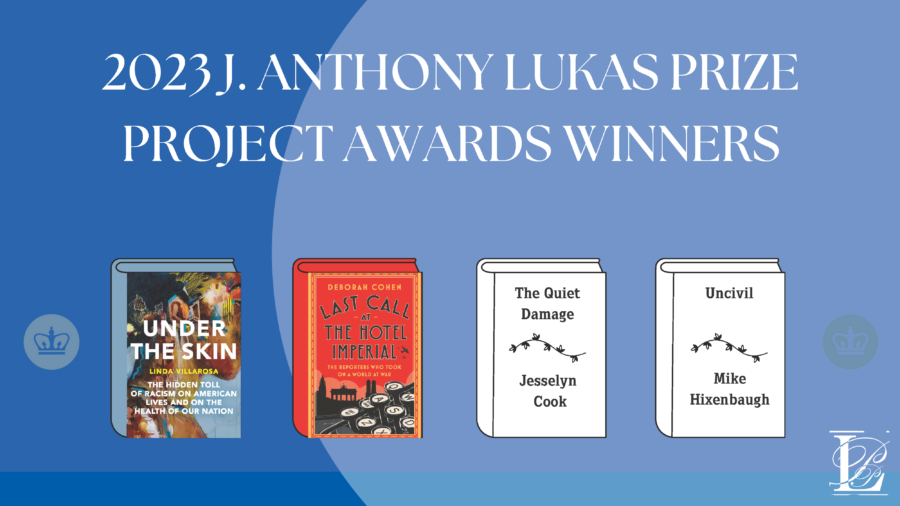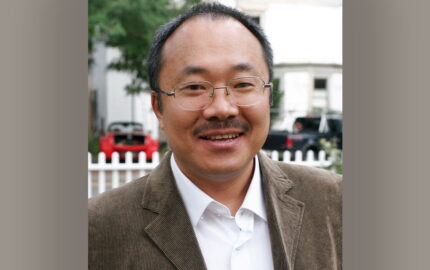Columbia Journalism School and the Nieman Foundation for Journalism at Harvard are pleased to announce the four winners and two finalists of the 2023 J. Anthony Lukas Prize Project Awards. The Lukas Prizes, established in 1998 and consisting of the J. Anthony Lukas Work-in-Progress Awards, the J. Anthony Lukas Book Prize, and the Mark Lynton History Prize, honor the best in American nonfiction writing.
The awards ceremony will take place on Wednesday, May 3, at Columbia Journalism School.
Winners and Finalists of the 2023 Lukas Prizes:
Anthony Lukas Work-in-Progress Award Winners
- Jesselyn Cook, The Quiet Damage: QAnon and the Destruction of the American Family (Crown)
- Mike Hixenbaugh, Uncivil: One Town’s Fight over Race and Identity, and the New Battle for America’s Schools (Mariner Books)
Anthony Lukas Book Prize
- Winner: Linda Villarosa, Under the Skin: The Hidden Toll of Racism on American Lives and on the Health of Our Nation (Doubleday)
- Finalist: Robert Samuels and Toluse Olorunnipa, His Name Is George Floyd: One Man’s Life and the Struggle for Racial Justice (Viking)
Mark Lynton History Prize
- Winner: Deborah Cohen, Last Call at the Hotel Imperial: The Reporters Who Took on a World at War (Random House)
- Finalist: Kelly Lytle Hernández, Bad Mexicans: Race, Empire & Revolution in the Borderlands (W.W. Norton)
About the Prizes:
Established in 1998, the J. Anthony Lukas Prize Project honors the best in American nonfiction writing. Co-administered by the Columbia University Graduate School of Journalism and the Nieman Foundation for Journalism at Harvard, and sponsored by the family of the late Mark Lynton, a historian and senior executive at the firm Hunter Douglas in the Netherlands, the Lukas Prize Project annually presents four awards in three categories.
Anthony Lukas Work-In-Progress Awards (two $25,000 prizes):
The J. Anthony Lukas Work-in-Progress Awards are given annually to aid in the completion of significant works of nonfiction on American topics of political or social concern. These awards assist in closing the gap between the time and money an author has and the time and money that finishing a book requires. Judges this year: Paul Golob (chair), Alia Malek, and Paige Williams.
Jesselyn Cook, The Quiet Damage: QAnon and the Destruction of the American Family (Crown)

Jesselyn Cook is an Atlanta-area journalist whose reporting focuses on online dangers, including weaponized conspiracy theories and other disinformation. Prior to working as an investigative tech reporter at NBC News, she was a senior reporter on the national enterprise desk at HuffPost and an adjunct journalism professor at the University of La Verne. She received her master’s degree in international relations and journalism from New York University.
The Quiet Damage examines the psychological draw of QAnon and adjacent conspiracy theories, their devastating toll on American families, and the power of divisions that could last for generations in American life. It follows five everyday families torn apart at the seams, intimately chronicling their stories from the perspectives of both those lost down ideological rabbit holes and their loved ones looking on as they try to find a way back to each other.
Judges’ citation: Jesselyn Cook’s The Quiet Damage is a harrowing exploration of the harm the far-right conspiracy theory movement QAnon has wrought on U.S. society, specifically at its most basic and intimate level, the family. QAnon—situated within the dangerous crosscurrents of disinformation, partisan dysfunction, and identity politics—has often been dismissed by most Americans as a fringe movement, but its potential to wreak broader havoc was clearly underestimated. Cook’s narrative reveals how seemingly ludicrous beliefs take hold of people who are easily recognizable to any reader, even as they become unrecognizable to their loved ones. Cook’s empathetic portrait of real families shattered by QAnon viscerally conveys the depth of their loss and devastation, as well as the urgency with which we must confront this phenomenon.
Mike Hixenbaugh, Uncivil: One Town’s Fight over Race and Identity, and the New Battle for America’s Schools (Mariner Books)
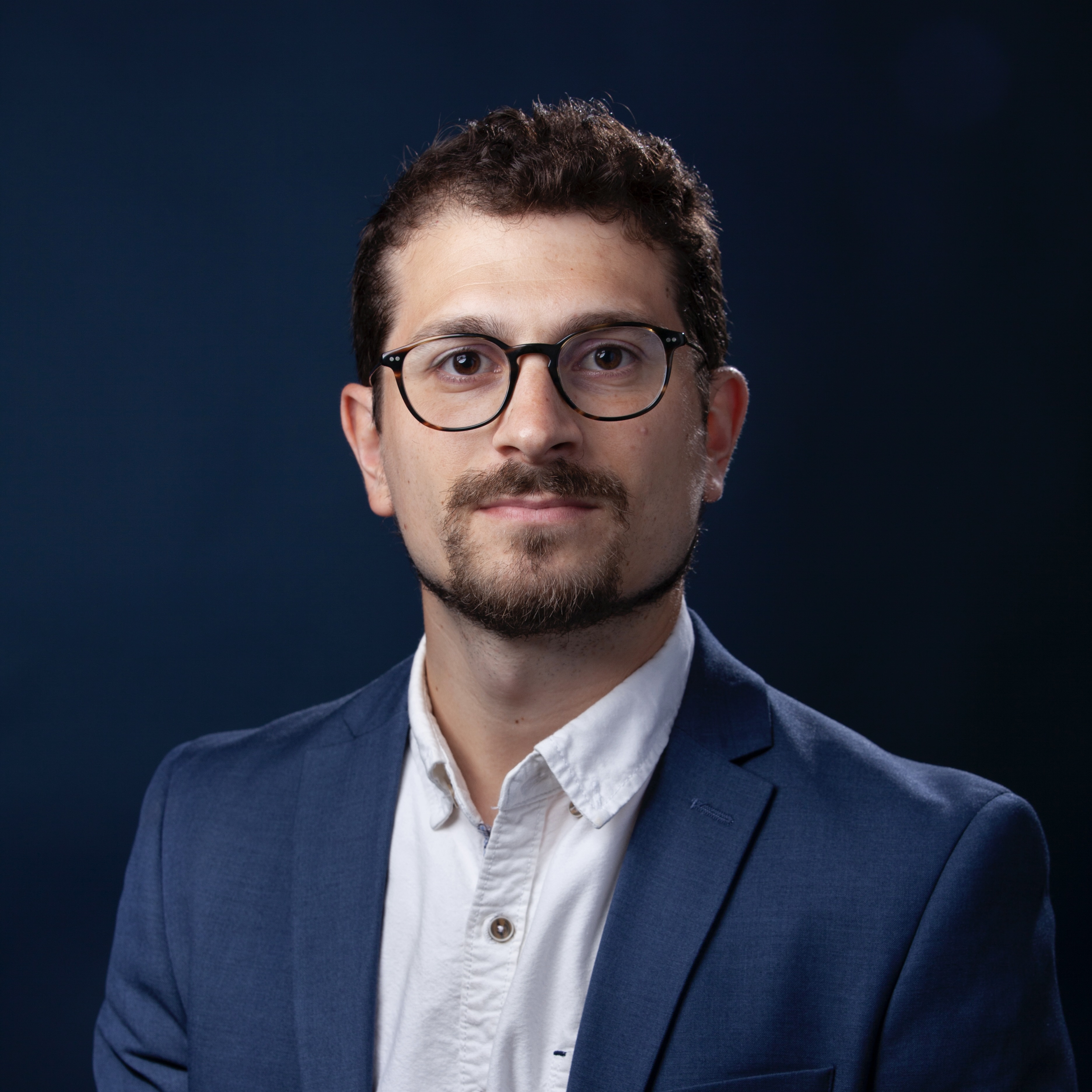
Mike Hixenbaugh is a senior investigative reporter for NBC News. After graduating from the University of Akron in 2007, he went to work at newspapers in Ohio, North Carolina, Virginia, and Texas, where his reporting uncovered deadly failures in the U.S. military, abuses in the child welfare system, and safety lapses at major hospitals. His reporting with Antonia Hylton on the battle to restrict classroom discussions on race, gender, and sexuality won a Peabody Award and was named a finalist for a Pulitzer Prize. Hixenbaugh lives in Houston with his wife and four children.
Uncivil takes readers inside the Christian nationalist campaign to take control of public education in the U.S., placing this movement in historical context while illuminating the harrowing stories of students and teachers whose lives have been upended. Hixenbaugh anchors the narrative in a wealthy Texas suburb where a conservative backlash against the racial reckoning of 2020 becomes a national model—or cautionary tale, depending on who you ask—in the new battles over critical race theory and LGBTQ inclusion that have since spread to every corner of the country. Uncivil pulls back the curtain on the powerful forces driving this crusade and traces the rise of a new resistance movement led by a diverse coalition of student activists, fed-up educators, and parents. Hixenbaugh connects this moment with past fundamentalist campaigns to censor classroom lessons on racism deemed ungodly or un-American, and in doing so, reveals what’s at stake when public schools become the frontline of our nation’s most foundational divisions.
Judges’ citation: The fraught issue of race in America’s schools is the focus of Mike Hixenbaugh’s immersive and urgent reporting in Uncivil, in which he describes how and why the suburbs have been consumed by toxic political and cultural battles that threaten to undermine the system of public education in the United States. The school district in Southlake, Texas, seemed to offer everything that parents would want for their children—small classes, dedicated teachers, financial resources, a track record of academic success, and school spirit in abundance. After a series of troubling incidents became public and a program to promote racial understanding was proposed, the atmosphere curdled and tore the community apart. Hixenbaugh recounts these events through the perspective of students, parents, teachers, and others whose lives and assumptions were upended, ultimately illuminating a coordinated, well-funded, escalating effort by conservative extremists to preserve their power and dominance.
Anthony Lukas Book Prize ($10,000):
The J. Anthony Lukas Book Prize recognizes superb examples of nonfiction writing that exemplify the literary grace, commitment to serious research, and original reporting that characterized the distinguished work of the award’s namesake, J. Anthony Lukas. Books must be on a topic of American political or social concern published between January 1 and December 31, 2022. Judges this year: Jessica Bruder (chair), Emily Bazelon, Shereen Marisol Meraji, and Vann R. Newkirk II.
Winner: Linda Villarosa, Under the Skin: The Hidden Toll of Racism on American Lives and on the Health of Our Nation (Doubleday)
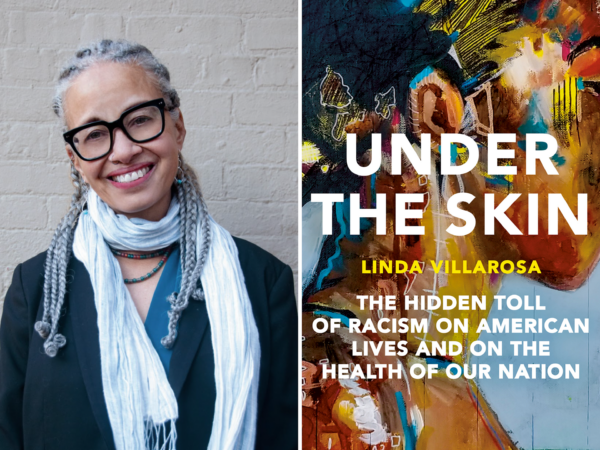
Linda Villarosa is a professor at the Craig Newmark Graduate School of Journalism at CUNY with a joint appointment at the City College of New York, as well as a contributing writer at The New York Times Magazine, where she covers the intersection of race and health. She has also served as executive editor at Essence and as a science editor at The New York Times. Her 2018 article on maternal and infant mortality was a finalist for a National Magazine Award. She is a contributor to The 1619 Project.
In Under the Skin, Linda Villarosa lays bare the forces in the American health care system and in American society that cause Black people to “live sicker and die quicker” compared to their white counterparts. Today’s medical texts and instruments still carry fallacious slavery-era assumptions that Black bodies are fundamentally different from white bodies. Study after study of medical settings shows worse treatment and outcomes for Black patients. Black people live in dirtier, more polluted communities due to environmental racism and neglect from all levels of government. Most powerfully, Villarosa describes the new understanding that coping with the daily scourge of racism ages Black people prematurely. Anchored by unforgettable human stories and backed by definitive proof, Under the Skin is dramatic, tragic, and necessary reading.
Judges’ citation: Under the Skin is a poignant, deeply reported investigation of the racial inequalities underlying the U.S. medical system. Leveraging decades of experience as a health journalist, Linda Villarosa probes some of the starkest disparities: gaps in average life expectancy and the quality of care afforded Black and white Americans. She builds her argument on a scaffold of rigorous—and sometimes shocking—research, while painting vivid scenes behind the statistics. Villarosa recounts the Section 8 apartment of the Relf sisters, who were involuntarily sterilized as children at a federally funded clinic in Alabama; the Louisiana labor and delivery room where an underpaid doula demands dignity for her callously mistreated Black client; the Colorado veterans’ hospital where Villarosa, horrified, finds her own critically ill father—now thin, disheveled and in leg restraints—and must lobby his caregivers for dignity. Through it all, Villarosa is a skilled, steady, and even generous guide, recounting her own awakening to the outcomes of systemic bias and inviting readers to join her on the other side of that journey. Under the Skin is elegantly written, revelatory and, given the crisis of Black maternal and infant mortality, utterly necessary.
Finalist: Robert Samuels and Toluse Olorunnipa, His Name Is George Floyd: One Man’s Life and the Struggle for Racial Justice (Viking)
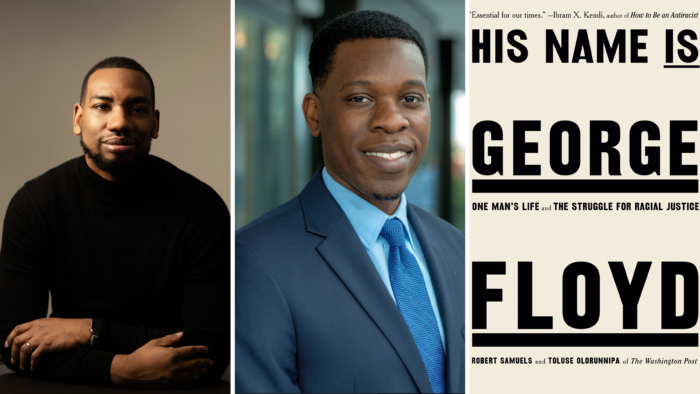
Robert Samuels became a staff writer at The New Yorker in March 2023, focusing on politics, policy, and the changing American identity. He wrote His Name Is George Floyd during his tenure as a national political enterprise reporter for The Washington Post, where he worked for 12 years. Prior to the Post, he worked at the Miami Herald.
Toluse Olorunnipa is the White House bureau chief for The Washington Post. He joined the Post in 2019 and has covered three presidencies. He previously worked at Bloomberg, where he reported on politics and policy from Washington and Florida.
The video recording of George Floyd’s death set off the largest protest movement in the history of the United States, awakening millions to the pervasiveness of racial injustice. His Name Is George Floyd puts today’s inequality into uniquely human terms. It tells the story of a beloved figure from Houston’s housing projects as he faced the stifling systemic pressures that come with being a Black man in America. Placing his narrative within the context of the country’s enduring legacy of institutional racism, this deeply reported account examines Floyd’s family roots in slavery and sharecropping, the segregation of his schools, the overpolicing of his community amid a wave of mass incarceration, and the callous disregard of his struggle with addiction. Drawing upon hundreds of interviews with Floyd’s closest friends and family, his teachers and coaches, civil rights icons, and those in the highest seats of political power, Robert Samuels and Toluse Olorunnipa offer a poignant and moving exploration of George Floyd’s America, revealing how a man who simply wanted to breathe ended up touching the world.
Judges’ citation: When Minneapolis police killed George Floyd in 2020, it sparked an American reckoning—and, in the public eye, reduced a man’s life to nine minutes and twenty-nine seconds. His Name Is George Floyd fills in the 46 years that came before, restoring to Floyd’s story the complexity he was denied in death. Building on reporting from The Washington Post, Robert Samuels and Toluse Olorunnipa offer a definitive account of Floyd’s life. They follow his journey, from the hospital in Fayetteville, North Carolina, where Floyd was born, to the housing projects in Houston’s Third Ward where he was raised, to the Minneapolis suburb of St. Louis Park, where he sought a fresh start. The authors share historical and contemporary context that reveals how American racism contoured Floyd’s experience long before it contributed to his end. Their account reads with the propulsive quality of a novel, depicting a man who, despite his flaws, was deeply beloved and optimistic, who dreamed of changing the world until, in the most devastating way, he succeeded.
Mark Lynton History Prize ($10,000):
The Mark Lynton History Prize is awarded to the book-length work of narrative history, on any subject, that best combines intellectual distinction with felicity of expression. Books must have been published between January 1, 2022, and December 31, 2022. Judges: Elizabeth Taylor (chair), Deirdre Mask, and William G. Thomas III.
Winner: Deborah Cohen, Last Call at the Hotel Imperial: The Reporters Who Took on a World at War (Random House)

Deborah Cohen is the Richard W. Leopold Professor of History at Northwestern University. Her previous books include The War Come Home: Disabled Veterans in Britain and Germany, 1914-1939 and Family Secrets: Shame and Privacy in Modern Britain. She writes for The Atlantic, The New York Review of Books, and The Wall Street Journal. She lives in Chicago.
They were an astonishing group: glamorous, gutsy, and irreverent to the bone. Last Call at the Hotel Imperial is the extraordinary story of the American foreign correspondents John Gunther, H.R. Knickerbocker, Vincent Sheean, and Dorothy Thompson. In the tumultuous years between the world wars, they landed exclusive interviews with Hitler, Mussolini, Nehru, and Gandhi, and helped to shape what Americans knew about the world. Unable to separate themselves from the global turmoil, they broke longstanding taboos about proper subjects for reporting. Over doubles knocked back late at night, they argued about love, war, sex, death, and everything in between. Told with the immediacy of a conversation overheard, this revelatory book captures how the global upheavals of the 20th century felt up close.
Judges’ citation: Cohen’s brilliant ensemble drama features American newspaper correspondents John Gunther, Dorothy Thompson, Vincent “Jimmy” Sheean, and H.R. Knickerbocker as each arrives in Europe after World War I and chases stories that lead readers at home to reimagine their place in a changing world. Perceptive and unabashedly inquisitive, Cohen has written not only a rich cultural history but a commanding and inspiring account of war and politics in the 1930s. As they witnessed the rise of fascism and debated communism, these reporters shared a conviction that the idea of journalistic objectivity should be set aside. Truth was more important, as Sheean put it, than a “litany of facts.” They wrote what they felt and thought about the world in crisis. Cohen’s extraordinary narrative combines distinctive literary style and deep archival revelations to illuminate the personal as political. She captures these writers as passionate idealists facing a world in crisis, their messy lives caught in a swirl of infidelity and loyalty, love and rivalry, pride and loss. Last Call is to be savored like a dry martini at Vienna’s Hotel Imperial bar.
Finalist: Kelly Lytle Hernández, Bad Mexicans: Race, Empire & Revolution in the Borderlands (W.W. Norton)
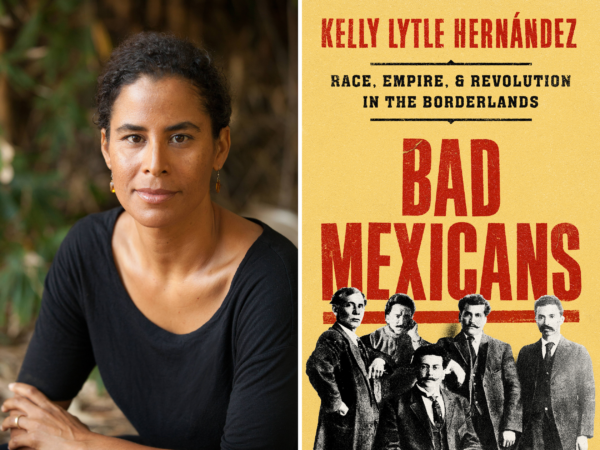
Kelly Lytle Hernández holds The Thomas E. Lifka Endowed Chair in History and directs the Ralph J. Bunche Center for African American Studies at UCLA. A 2019 MacArthur “Genius Grant” recipient, she is the author of the award-winning books Migra! and City of Inmates. She lives in Los Angeles.
Bad Mexicans tells the dramatic story of the magonistas, the migrant rebels who sparked the 1910 Mexican Revolution from the United States. Led by a brilliant but ill-tempered radical named Ricardo Flores Magón, the magonistas were a motley band of journalists, miners, migrant workers, and others, who organized thousands of Mexican workers—and American dissidents—to their cause. Determined to oust Mexico’s dictator, Porfirio Díaz, who encouraged the plunder of his country by U.S. imperialists such as Guggenheim and Rockefeller, the rebels had to outrun and outsmart the swarm of U.S. authorities vested in protecting the Díaz regime. They lived in hiding, wrote in secret code, and launched armed raids into Mexico until they ignited the world’s first social revolution of the 20th century. Taking readers to the frontlines of the magonista uprising and the counterinsurgency campaign that failed to stop them, Kelly Lytle Hernández puts the magonista revolt at the heart of U.S. history. Long ignored by textbooks, the magonistas threatened to undo the rise of Anglo-American power on both sides of the border and inspired a revolution that gave birth to the Mexican American population, making the magonistas’ story integral to modern American life.
Judges’ citation: In her vivid history, Kelly Lytle Hernández reframes the relationship between the United States and Mexico and argues that the Mexican Revolution not only transformed Central America but also shaped the United States in ways that endure to this day. Hernández has rendered a polyphonic account that entwines the rise of U.S. imperialism, the making of the American West, and the establishment of the “global color line.” Deeply researched and interwoven with archival sources held by allies and descendants of the revolutionaries, Hernández’s masterful narrative emphasizes the importance of the Mexican rebels led by radical Ricardo Flores Magón, whose grassroots movement of magonistas opposed the regime of authoritarian President Porfirio Díaz. Forced to flee across the border, the magonistas staged revolutionary movements across Mexico from their temporary bases in the United States, only to be pursued in turn by the U.S. Department of Justice intent on propping up the Díaz regime. Hernández’s revelatory and stunning account tells us how the Mexican Revolution, which forced more than a million Mexicans to flee, remade the United States and resonated beyond the U.S.-Mexico border.
About Columbia Journalism School
For more than a century, the school has been preparing journalists in programs that stress academic rigor, ethics, journalistic inquiry, and professional practice. Founded with a gift from Joseph Pulitzer, the school opened its doors in 1912 and offers Master of Science, Master of Arts, and Master of Science in Data Journalism degrees as well as a joint Master of Science degree in Computer Science and Journalism, and a Doctor of Philosophy in Communications. It houses the Columbia Journalism Review, the Brown Institute for Media Innovation, the Tow Center for Digital Journalism, and the Dart Center for Journalism and Trauma. The school also administers many of the leading journalism awards, including the Alfred I. duPont-Columbia University Awards, the Maria Moors Cabot Prizes, the John Chancellor Award, the John B. Oakes Award for Distinguished Environmental Journalism, the Dart Awards for Excellence in Coverage of Trauma, the Paul Tobenkin Memorial Award, and the Mike Berger Award.
www.journalism.columbia.edu | @columbiajourn
About the Nieman Foundation for Journalism at Harvard
The Nieman Foundation for Journalism at Harvard educates leaders in journalism, promotes innovation and elevates the standards of the profession. More than 1,700 journalists from 100 countries have been awarded Nieman Fellowships since 1938. The foundation also publishes Nieman Reports, a website and print magazine covering thought leadership in journalism; Nieman Journalism Lab, a website reporting on the future of news, innovation and best practices in the digital media age; and Nieman Storyboard, a website showcasing exceptional narrative journalism and nonfiction storytelling.
